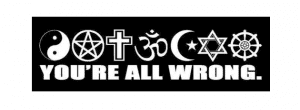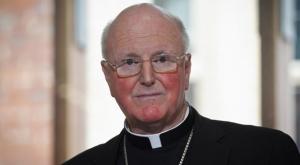States should only enforce those social obligations that are shared by all members of a society and which can be justified on the basis of publicly and universally available facts.
In my last blog I showed how the classical Muslim interpretation of the Qur’anic verse, “there is no compulsion in religion” is different from the Wester concept of freedom of religion.
This difference is rooted in different understandings of the relationship between a state and the religious obligations of its people.
Pre-modern Islamic states were built on much different foundations than those of modern states. First, they were built around the character of the leader of the state, and were defined by his relationship to his people on one hand, and his god on the other. In the case of the Muslim state the ideal leader was chosen through consultation of tribal leaders, and cemented to his people through their oath of loyalty to him. In relation to God he was “caliph,” or the steward of God’s law, and “imam,” or the leader of the whole community at prayer.
Secondly they were religious states whose claim to legitimacy lay in their relationship to God as revealed in the Qur’an and articulated through the traditions of Muhammad. Thus the fundamental task of the Caliph was to “command the good and resist evil.” His major task was to insure the moral behavior of his people through the implementation of God’s law. In this system the only legal distinction was between those laws regulating ritual worship of God and those regulating social relationships. All derived from God’s revelation, and all were equally the responsibility of the Muslim state and Muslim society. The only enforcement issue was the level of leadership within that state and society that would scrutinize people’s obedience. But always, in theory, the lowest peasant had the right to appeal to the Caliph.
When we see these characteristics of a classical Muslim state it is easy to see why the Qur’anic verse “there is no compulsion in religion” was not interpreted to mean that Muslims were free to change their religion. While embracing Islam was clearly a moral good, leaving Islam for another religion was clearly a moral evil, since that other religion was at best inferior and at worst satanic. A moral society and state could not countenance a clearly immoral decision.
And all of this would have been true in pre-modern Europe with its Christian societies as well.
The problem in such a religious state is three-fold. First internal religious disagreements always give rise to different religious sects, some of which disagree on what God’s law commands. Secondly the boundaries of being within and outside the state religion are constantly being challenged by these sects. And thirdly the dignity of the state and society is threatened by any real or perceived attack on its religious basis. The result is that religious states must be constantly concerned with the problems of heresy, apostasy, and blaspheme.
And this in turn creates (as it did in Catholic Europe and the Islamic world) complex inter-dependencies of the state and religious authorities. And it creates constant sectarian tension and frequent religious strife – all made worse because the power of the state can be marshaled against sectarian enemies. Rare were the periods in either Islamic or Christian history when Muslim and Christian states did not suffer from such turmoil to some degree.
All the problems mentioned above are exacerbated when such a religious state becomes more religiously and culturally pluralistic.
The secular state as we know it was created to avoid these problems. By removing itself from religious concerns the state equally removed itself from sectarian disagreements over moral obligations. Nor was it concerned with blaspheme, since the dignity of the state was no longer linked to the dignity of religious dogma or religious figures.
But what of morality? Does the secular state abandon the possibility of being a moral state?
The answer is no. The secular state does not abandon being moral. Indeed moral discourse remains firmly a part of political discourse. One need only examine the recent US presidential campaign to see this. It does, however, shift the basis for moral decision making in two ways. First, determining what is moral is moved away from decisions made by a religious establishment to decisions made by the majority of citizens (at least in a democracy.) And secondly this decision making process takes place through public debate and appeal to information available to and known by all or a majority of citizens rather than to a privileged revelation or interpretation.
So to use a contemporary American example, if you want to argue that marriage should only be between a man and a woman you must show that your view is based on information and analysis available to everyone (or at least a majority) rather than a particular sectarian interpretation of scripture. You cannot appeal to the Bible, the Qur’an, or a particular interpretation of either and necessarily expect that your fellow citizens will accept its validity.
This is even more the case in the United States, where the constitution explicitly forbids the government to engage in establishing sectarian religious views in law.
The great advantage of the secular state is that it requires citizens to be engaged across religious and sectarian divides in order for it to implement a moral order. Citizens and their leaders must seek the universal rather than the particular for the state to function.
The transition to a secular state has not been easy in the Muslim world, or indeed in the non-Western world. Secular states are associated with both colonialism and Western nations that appear to many to be highly immoral. Yet the alternative, a religious state, appears from its modern manifestations to be the way only toward endless sectarian violence and the oppression of religious minorities.
Fortunately there are Muslim political theorists (Tarik Ramadan for example) willing to move beyond classical ideas of an Islamic state, or indeed newer formulations of the Islamic state concept, to explore how Muslims (and for that matter faithful persons of all religions) can be engaged together, fruitfully, in a modern democratic state that is both moral and free.











